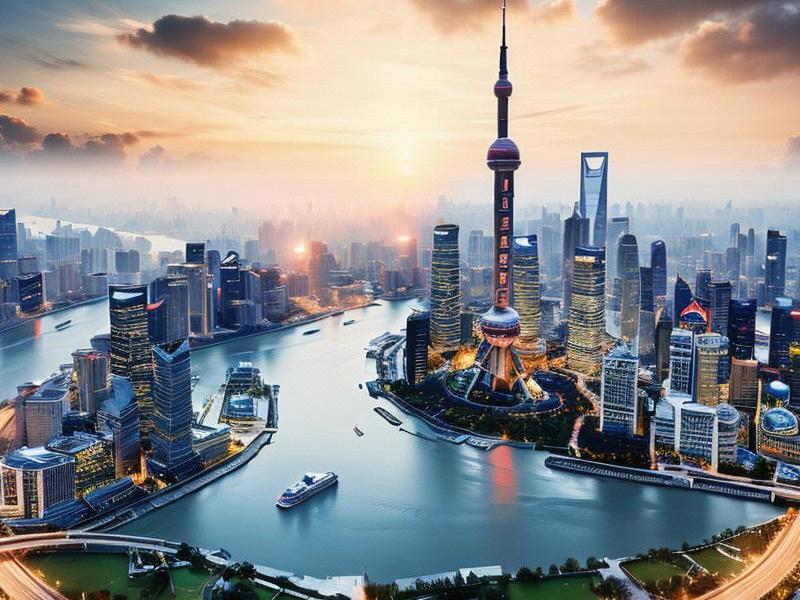
Shanghai, the bustling metropolis on the banks of the Huangpu River, has long been a symbol of China's rapid economic growth and urbanization. Over the past few decades, Shanghai has undergone a remarkable transformation, evolving from a traditional port city into a global hub for innovation, sustainability, and cultural exchange. This article explores the key factors that have driven Shanghai's transformation and the challenges it continues to face in maintaining its position as a leading city in the 21st century.
Urban Development: Building a Modern City
One of the most striking aspects of Shanghai's transformation is its urban development. The city has undergone a massive expansion, with iconic skyscrapers like the Shanghai Tower, Jin Mao Tower, and the Oriental Pearl Tower becoming symbols of its modernity. These architectural marvels not only showcase Shanghai's economic prowess but also reflect its commitment to creating a world-class city.
The Pudong area, once a rural region, has been transformed into a bustling financial and commercial district. The Lujiazui Financial District, home to the Shanghai Stock Exchange and numerous multinational corporations, is a testament to Shanghai's status as a global financial hub. The development of Pudong has been instrumental in attracting foreign investment and fostering economic growth.
However, urban development in Shanghai has not been without challenges. The rapid pace of construction has led to issues such as overcrowding, traffic congestion, and housing shortages. To address these challenges, the city government has implemented various measures, including the expansion of public transportation networks, the promotion of green spaces, and the development of affordable housing projects.
Technological Advancements: Pioneering Innovation
上海龙凤419贵族 Shanghai's transformation is also characterized by its emphasis on technological advancements. The city has invested heavily in research and development, positioning itself as a leader in innovation. The Zhangjiang Hi-Tech Park, one of China's largest technology parks, houses numerous high-tech companies, startups, and research institutions. It has become a hub for biotechnology, information technology, and new materials.
The city's commitment to innovation is evident in its efforts to develop smart cities. Shanghai has implemented various smart technologies, such as intelligent transportation systems, digital healthcare, and smart grid infrastructure. These initiatives aim to improve the quality of life for residents, enhance urban efficiency, and promote sustainable development.
In addition to technological advancements, Shanghai has also been a pioneer in the digital economy. The city has embraced e-commerce, fintech, and digital media, attracting leading tech companies like Alibaba, Tencent, and ByteDance. The digital economy has become a significant driver of Shanghai's economic growth, creating new opportunities for businesses and job creation.
Environmental Initiatives: Striving for Sustainability
As a global city, Shanghai recognizes the importance of environmental sustainability. The city has implemented various initiatives to reduce its carbon footprint and promote green development. One of the key strategies is the promotion of renewable energy sources. Shanghai has invested in solar and wind power projects, aiming to increase the share of renewable energy in its energy mix.
The city has also been actively promoting green transportation. The expansion of the metro system, the introduction of electric buses, and the development of bike-sharing programs have significantly reduced traffic congestion and air pollution. Shanghai's efforts in green transportation have set an example for other cities around the world.
上海贵族宝贝自荐419 In addition to renewable energy and green transportation, Shanghai has also focused on waste management and recycling. The city has implemented strict regulations on waste disposal and has promoted the use of reusable and recyclable products. These measures have helped reduce the amount of waste generated by the city and improve its overall environmental performance.
Cultural Exchange: A Global City
Shanghai's transformation is not limited to urban development and technological advancements. The city has also become a global hub for cultural exchange. Its rich history and diverse population have created a unique cultural landscape that attracts visitors from around the world.
The Bund, a historic waterfront area, showcases Shanghai's colonial architecture and serves as a popular tourist destination. The Yu Garden, a classical Chinese garden, offers a glimpse into the city's traditional culture. These cultural landmarks, along with numerous museums, art galleries, and theaters, make Shanghai a vibrant cultural center.
Shanghai has also been a host to numerous international events, such as the Shanghai International Film Festival, the Shanghai World Expo, and the Shanghai Fashion Week. These events have enhanced the city's global profile and fostered cultural exchange between China and the rest of the world.
爱上海419论坛 Challenges and the Way Forward
Despite its remarkable achievements, Shanghai continues to face several challenges in its journey towards becoming a global leader. One of the major challenges is balancing economic growth with environmental sustainability. As the city continues to grow, it must address issues such as air pollution, water scarcity, and waste management.
Another challenge is managing the social impacts of urbanization. The rapid pace of development has led to increased housing costs, social inequality, and pressure on public services. The city government must implement policies that promote inclusive growth and ensure that the benefits of urbanization are shared by all residents.
Furthermore, Shanghai must navigate the complexities of globalization and international competition. As other cities around the world invest in innovation and sustainability, Shanghai must continue to innovate and adapt to remain a global leader.
In conclusion, Shanghai's transformation is a testament to the city's resilience, adaptability, and commitment to progress. Through urban development, technological advancements, environmental initiatives, and cultural exchange, Shanghai has emerged as a global hub for innovation and sustainability. While challenges remain, the city's determination to overcome them and continue its journey towards a brighter future is unwavering.
As Shanghai looks ahead, it must continue to prioritize sustainable development, inclusive growth, and cultural exchange. By doing so, it can set an example for other cities around the world and contribute to a more sustainable and equitable global society.
